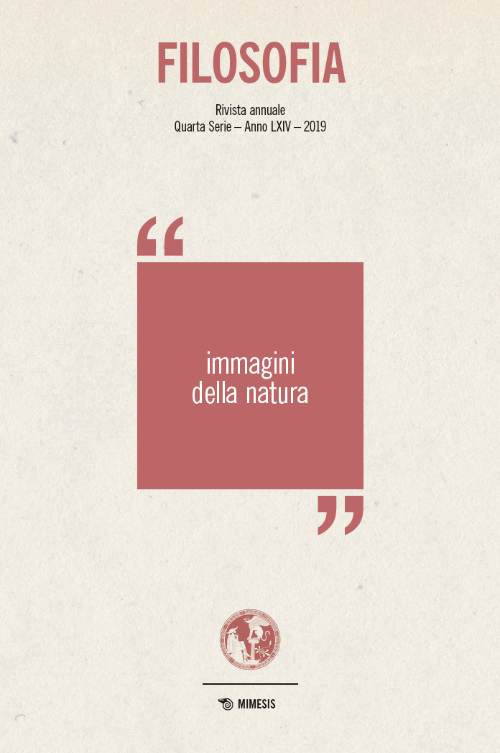L’ordine della natura e la struttura del linguaggio
DOI:
https://doi.org/10.13135/2704-8195/4062Parole chiave:
leggi di natura, strutture della comunicazione, ontologiaAbstract
In this paper the relationship between the issue of induction and the patterns of communication will be inquired. The basic idea is that the process of communication is intrinsically linked with the use of the topic-comment structure, and this linguistic pattern conducts the human mind to retain that the reality is ontologically organized in substances (or individuals) and accidents (or more generally, properties). It is proposed that the ontological meaning of the laws of nature can be better explained by the attempt to show that other patterns of thought are available. So it will be proposed a semantics that is based more substantially on names, and not on propositions or topic-comment structures. Our instinctive trust in laws of nature is interpreted as the consequence of the ontological connections between the respective references of the names. Some ideas of Emanuele Severino are put in comparison with this theoretical sketch.
Downloads
Riferimenti bibliografici
M. Black, Manualeper il Tractatus di Wittgenstein (1964), tr. it. di R. Simoni, Roma, Astrolabio, 1967
G. Bontadini, Lettera a Severino, in “Spirali”, XXI (1980), n. 7, pp. 30-34
F. H. Bradley, Appearance and Reality, London, Sonnenschein, 1893²
K. Bühler, Teoria del linguaggio (1934), tr. it. di S. Cattaruzza, Roma, Armando, 1983
S. Candlish, The Russell/Bradley Dispute and its Significance for Twentieth Cen-tury Philosophy, Basingstoke, Palgrave MacMillan, 2007
S. Candlish, N. Damnjanovic, The Tractatus and the Unity of the Proposi-tion, in Wittgenstein’s Early Philosophy, a cura di J. Zalabardo, Oxford, Oxford University Press, 2012, pp. 64-98
G. Frongia, Wittgenstein. Regole e sistema, Milano, Angeli, 1983
R. Gaskin, The Unity of Declarative Sentence, in “Philosophy”, LXXIII (1998), n. 283, pp. 21-45
J. Hintikka, M. Hintikka, Indagine su Wittgenstein (1986), tr. it. di M. Alai, Bologna, il Mulino, 1990
C. Hockett,The Problem of Universals in Language, inUniversals of Language, a cura di J. H. Greenberg, Cambridge, M.I.T. Press, 1966, pp. 1-29
P. Laspia, L’articolazione linguistica, Roma, Carocci, 1997
Parmenide, Poema sulla natura, tr. it. di G. Reale, Milano, Bompiani, 2003
D. Pears, Russell’s 1913 Theory of Knowledge Manuscript, in Rereading Russell: Essays on Bertrand Russell’s Metaphysics and Epistemology, a cura di C. Savage e C. Anderson, Minneapolis, Minnesota University Press, 1989, pp. 169-182
J. Piaget, La costruzione del reale nel bambino (1937), tr. it. di G. Gorla, Firenze, Nuova Italia, 1973
K. R. Popper, Congetture e confutazioni (1963), tr. it. di G. Pancaldi, Bologna, il Mulino, 1972
W. V. O. Quine, L’epistemologia naturalizzata, in Idem, La relatività ontologica e altri saggi (1969), tr. it. di M. Lionelli, Roma, Armando, 1986, pp. 95-113
L. Ruggiu, Nostos. L’essere e gli enti, Milano-Udine, Mimesis, 2014²
B. Russell, My Mental Development, in The Philosophy of Bertrand Russell, a cura di P. Schilpp, Evanston, Open Court Publishing Company, 1944, pp. 1-20
B. Russell, Theory of Knowledge, The 1913 Manuscript, a cura di E. Ramsden Eames e K. Blackwell, London-New York, Routledge, 1992²; D. Pears, The Relation between Wittgenstein’s Picture Theory of Propositions and Russell’s Theory of Judgment, in “ThePhilosophicalReview”, LXXXVI (1977), n. 2, pp. 177-196
D. Sacchi, Unità e relazione, Milano, Vita e Pensiero, 1981
E. Severino, Destino della necessità, Milano, Adelphi, 1980
E. Severino, La struttura originaria, Milano, Adelphi, 1981².
E. Severino, Tautótēs, Milano, Adelphi, 1995, p. 136.
E. Severino, Ritornare a Parmenide, in Idem, Essenza del nichilismo, Milano, Adelphi, 1995²
E. Severino, Intorno al senso del nulla, Milano, Adelphi, 2013
A. Stella, Il concetto di ‘relazione’ nell’opera di Severino, a partire da La struttura originaria, Milano, Guerini, 2018
M. Untersteiner, Parmenide, Firenze, La Nuova Italia, 1958;
V. Vitiello, La logica dell’inerenza di Emanuele Severino, in E. Severino, V. Vitiello, Dell’essere e del possibile, Milano-Udine, Mimesis, 2018, pp. 56-78
L. Wittgenstein, Tractatus logico-philosophicus (1921), in Idem, Tractatus logico-philosophicus (1922), tr. it. di A. G. Conte, Torino, Einaudi, 1964, prop. 2.021.
##submission.downloads##
Pubblicato
Come citare
Fascicolo
Sezione
Licenza
Filosofia applica una licenza Creative Commons Attribution 4.0 International License a tutto il materiale pubblicato.




